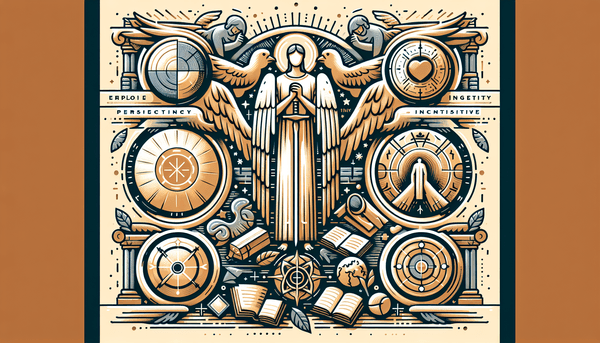The Meaning of 'Legions' in the Bible
When Jesus speaks of the ability to summon more than twelve legions of angels, He references a Roman military unit, which typically accounted for about 6,000 soldiers. This metaphor underscores the magnitude of divine power at His disposal, far surpassing any earthly force. Despite this, Christ chose to submit to the will of the Father, as described in Matthew 26:53, rather than wield this overwhelming might. This restraint illustrates not only the authority of Jesus but also His dedication to fulfill the divine plan without resorting to violence. The concept of spiritual warfare, as mentioned in Ephesians 6:12, and the protection offered by angels, as in Psalm 91:11-12, further highlight the significance of Jesus' decision to rely on the Father's will, setting an example of trust and obedience for believers.
Conclusion
Our journey through these biblical themes reveals the depth and complexity of the scriptures. From the silent vigil of angels at the crucifixion to the stern warnings against infidelity, and from the power Jesus held in check to the multifaceted storytelling of the Gospels, we see the Bible as a tapestry woven with divine wisdom. These narratives invite us to reflect on our own lives and to seek a deeper connection with the spiritual truths they embody. As we delve deeper, exploring the depths of humility and love becomes a natural extension of our study. As we close this chapter, let us carry forward the lessons learned and continue to seek understanding in the pages of the Bible, where history, morality, and divine purpose converge.
FAQ
Q: How many angels are in twelve legions?
A: In the Bible, a legion is a Roman military unit consisting of around 6,000 soldiers. When Jesus mentioned 'more than twelve legions of angels,' He was referring to a vast number of angels, far beyond what would be necessary to overcome His captors.
Q: Were angels going to save Jesus during his crucifixion?
A: No, while Jesus had the power to call upon angels for help, He chose to endure the cross for the salvation of mankind, as it was part of God's plan for redemption. The angels were present to bear witness to the suffering of Jesus and to minister to Him in His time of agony.
Q: How many Gospels are there?
A: There are four Gospels in the New Testament of the Bible: Matthew, Mark, Luke, and John. Each of these Gospels offers a unique perspective on the life, ministry, death, and resurrection of Jesus Christ.
Q: Why are there four different Gospels in the Bible?
A: The four different Gospels provide varied perspectives on Jesus Christ's life and teachings, addressing different audiences and highlighting distinct aspects of His ministry. Together, they give a fuller picture of Jesus' mission and message.






